The Chinese Zodiac is a rich and ancient astrological system that reflects the culture and beliefs of China. Each of the twelve zodiac animals represents distinct personality traits and influences, shaping an individual’s destiny according to their birth year. Understanding these signs not only provides insight into personal characteristics but also offers a glimpse into the historical context and cultural significance behind this fascinating system.
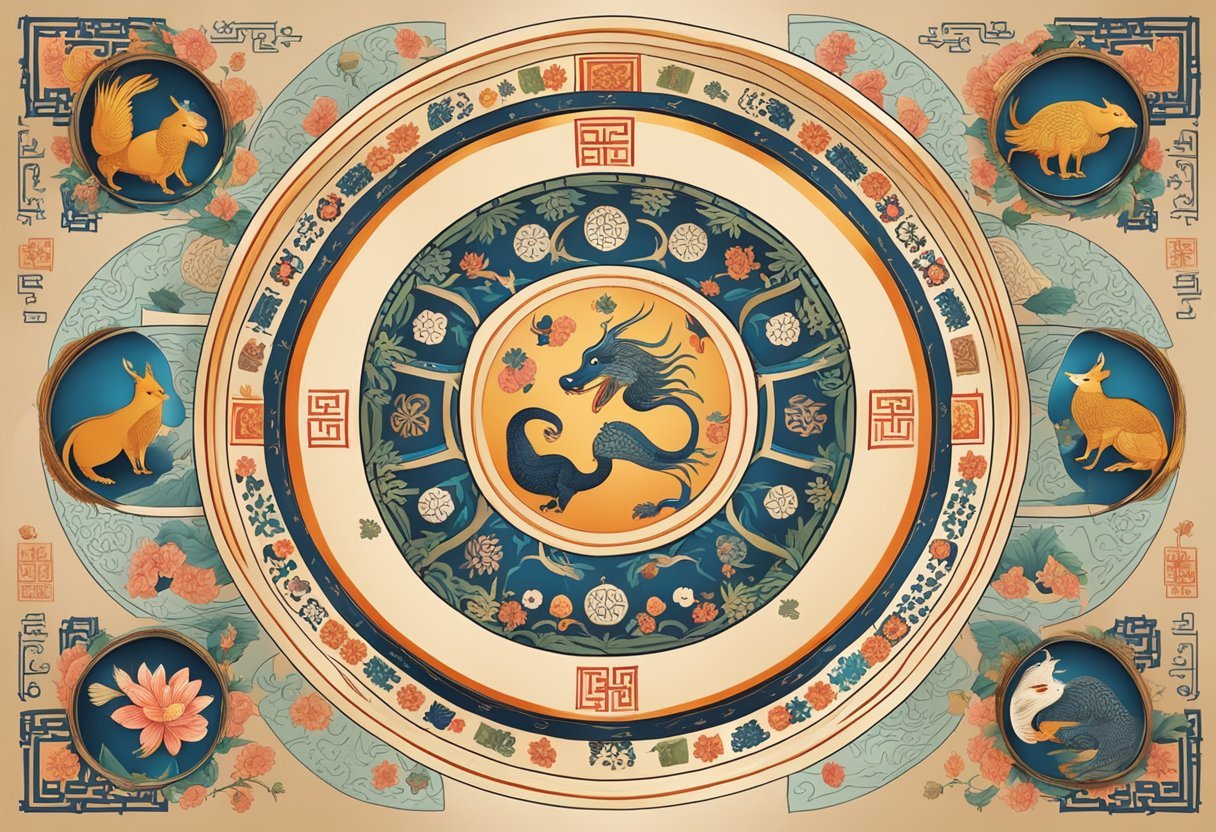
As one of the oldest astrological frameworks in the world, the origins of the Chinese Zodiac trace back thousands of years, intertwining mythology with astronomy and agricultural practices. The traits associated with each animal resonate deeply within Chinese society, influencing various aspects of life, from business decisions to personal relationships. Exploring the meanings and stories behind these zodiac signs reveals how they continue to impact contemporary culture.
Readers who delve into the world of Chinese Zodiac animals will discover a unique cultural phenomenon that extends beyond mere horoscopes. With practical applications in everyday life, understanding these astrological symbols can enrich one’s perspective on their own personality and relationships with others.
Key Takeaways
- The Chinese Zodiac includes twelve animals, each symbolizing unique traits.
- This astrological system has origins deeply rooted in Chinese history and culture.
- Understanding the Zodiac offers practical insights for personal growth and relationships.
Origins and Historical Development
The Chinese Zodiac has deep historical roots tied to ancient practices and various dynastic developments. Key themes such as the Lunar Calendar, influential mythology, and significant historical periods play crucial roles in understanding how the zodiac evolved over time.
Ancient Beginnings and the Lunar Calendar
The origins of the Chinese Zodiac can be traced back to ancient agricultural societies, where a lunar calendar was essential for planting and harvesting crops. The calendar consists of twelve cycles, each represented by an animal, which corresponded with the lunar year. This system was not only practical for daily life but also deeply embedded in cultural beliefs.
Some sources suggest that these animals symbolized certain characteristics that were thought to influence the personalities of individuals born under each sign. The cyclical nature of the Lunar Calendar reinforced the importance of harmony with natural cycles, marking time and cultural events. The Zodiac’s alignment with the lunar phases reflects its integration into the spiritual and temporal aspects of ancient Chinese life.
Mythology: The Jade Emperor and the Great Race
Central to the mythology surrounding the Chinese Zodiac is the tale of the Jade Emperor, who desired to create a way to measure time. To accomplish this, he organized a Great Race involving the twelve animals. According to legend, the first twelve animals to reach the Heavenly Gate would earn their place in the zodiac.
The cunning Rat, who rode on the back of the Ox, outsmarted its larger competitor and secured the first position. Other animals, such as the Tiger and Rabbit, followed in quick succession, each symbolizing unique traits that reflect strengths and weaknesses in human character. This myth not only explains the order of the zodiac signs but also contributes to cultural values associated with each animal.
Evolution Through Dynasties: From Qin to Han
The Chinese Zodiac underwent significant transformations during the Qin and Han Dynasties. The Qin Dynasty (221-206 BCE) saw the unification of various calendars and the formalization of the zodiac system. This centralization contributed to a more standardized cultural framework across China.
During the Han Dynasty (206 BCE – 220 CE), the zodiac gained further prominence, as it became intertwined with astrology and fortune-telling practices. Scholars documented the zodiac’s influence on festivals, rituals, and literature, solidifying its role in society. The integration of the Zodiac into the Chinese Calendar during this period ensured its ongoing relevance in cultural and social contexts, making it a vital aspect of Chinese identity.
Understanding the Chinese Zodiac
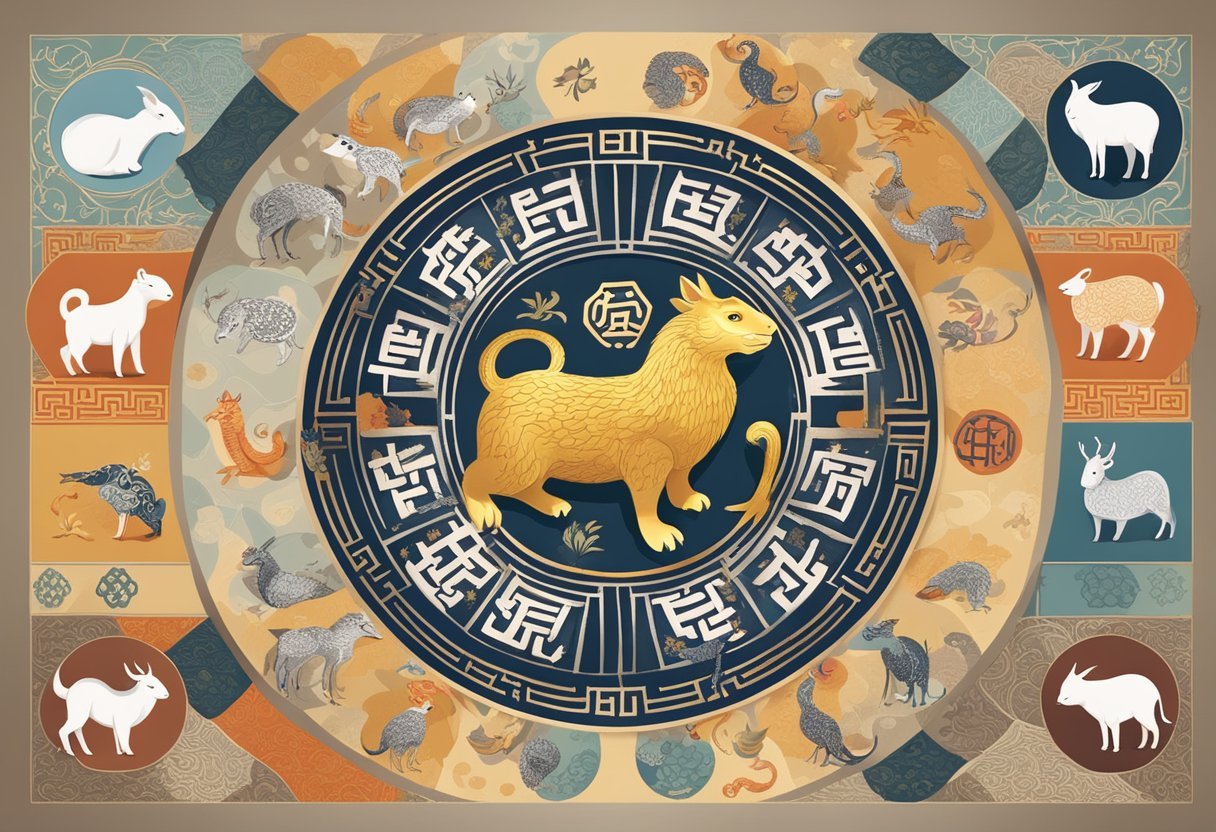
The Chinese Zodiac is a complex system that integrates various concepts, including the twelve animals, the Zodiac cycle, and elemental influences. By exploring these components, one gains insight into how this system shapes cultural beliefs and personal identities in Chinese culture.
The Zodiac Cycle and Its Elements
The Zodiac cycle consists of twelve years, each represented by an animal sign. This cycle is not linear; it connects with the Five Elements: Earth, Fire, Water, Wood, and Metal. Each element influences the characteristics of the animal it’s paired with.
For example, the year of the Rat corresponds with Water in specific cycles, enhancing traits like adaptability. This relationship between the Zodiac animals and the elements plays a significant role in determining personality traits and compatibility. Thus, understanding the cycle and elements is essential for interpreting insights from one’s Zodiac sign.
The Twelve Zodiac Animals and Their Attributes
The twelve Zodiac animals include the Rat, Ox, Tiger, Rabbit, Dragon, Snake, Horse, Goat, Monkey, Rooster, Dog, and Pig. Each animal embodies distinct attributes that impact individuals born in its year.
- Rat: Intelligent and resourceful
- Ox: Dependable and strong
- Tiger: Brave and competitive
- Rabbit: Peaceful and harmonious
- Dragon: Charismatic and powerful
- Snake: Wise and secretive
- Horse: Energetic and free-spirited
- Goat: Gentle and compassionate
- Monkey: Inventive and curious
- Rooster: Observant and diligent
- Dog: Loyal and friendly
- Pig: Generous and diligent
These attributes help shape personal and social dynamics within Chinese culture, highlighting the Zodiac’s significance in daily life.
Earthly Branches, Ten Celestial Stems, and 生肖
The Chinese Zodiac is intertwined with the concepts of Earthly Branches and the Ten Celestial Stems, known as 生肖 (Shēngxiào). Each Zodiac animal corresponds to an Earthly Branch, which functions as a cyclical system that interacts with the celestial stems to create a 60-year calendar.
The Earthly Branches incorporate agricultural cycles, while the Celestial Stems relate to Yin and Yang. This pairing generates a comprehensive framework for timekeeping and astrology, amplifying the Zodiac’s cultural relevance. Through this intricate system, individuals can explore deeper personal insights and alignments within Chinese astrology.
Cultural Impact and Significance
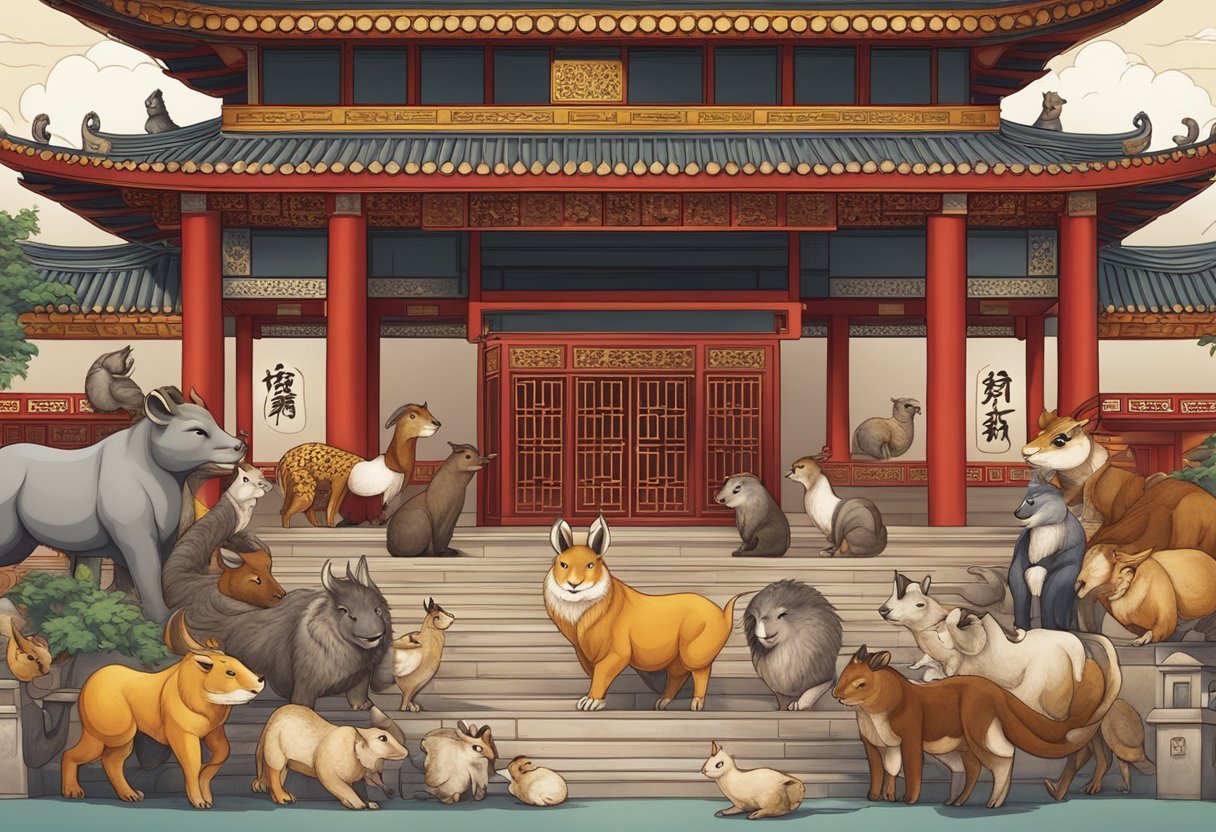
The Chinese Zodiac profoundly influences cultural practices and personal identity across various communities. Its significance is evident in festivals, rituals, and how individuals connect with their heritage.
Festivals and Celebrations
One of the most prominent representations of the Chinese Zodiac is during the Chinese New Year, also known as the Spring Festival. This celebration encompasses a range of traditions and rituals centered around the twelve zodiac animals. Each year, the animal sign associated with that year brings specific themes of luck and prosperity.
During the festivities, families perform rituals, such as cleaning their homes, to sweep away bad luck. The zodiac animals also feature prominently in decorations, parades, and traditional foods. For example, dumplings shaped like animals symbolize wealth and are often prepared in abundance. These practices significantly enhance communal bonds and cultural pride.
Influence Across Asia and Beyond
The influence of the Chinese Zodiac extends beyond China, impacting various cultures in Asia. Countries like Vietnam, South Korea, Thailand, and Cambodia have adopted their interpretations of the zodiac, celebrating it through local customs.
In Vietnam, for instance, the zodiac sign for each year also aligns with the lunar calendar; they celebrate Tet, which shares similarities with the Chinese New Year. In Japan, although the Zodiac plays a less prominent role, many still observe the New Year celebrations associated with the lunar calendar. In Singapore, the diverse cultural landscape allows for a fusion of Chinese customs with local traditions during festivities.
Role in Personal and Cultural Identity
The Chinese Zodiac contributes significantly to individual and collective identities. It shapes personal beliefs about fate, relationships, and fortune. Many people consider their zodiac sign when making decisions or seeking advice, believing that it provides insights into personality traits and compatibility.
In communities throughout Asia, the zodiac plays a central role in traditional practices and celebrations. It fosters a sense of belonging and continuity, linking generations to their cultural heritage. In places like Thailand and Vietnam, local interpretations of zodiac signs influence behaviors and societal norms, reinforcing cultural narratives that extend across generations. This ongoing relationship with the zodiac encourages a deeper connection to cultural identity.
Practical Applications
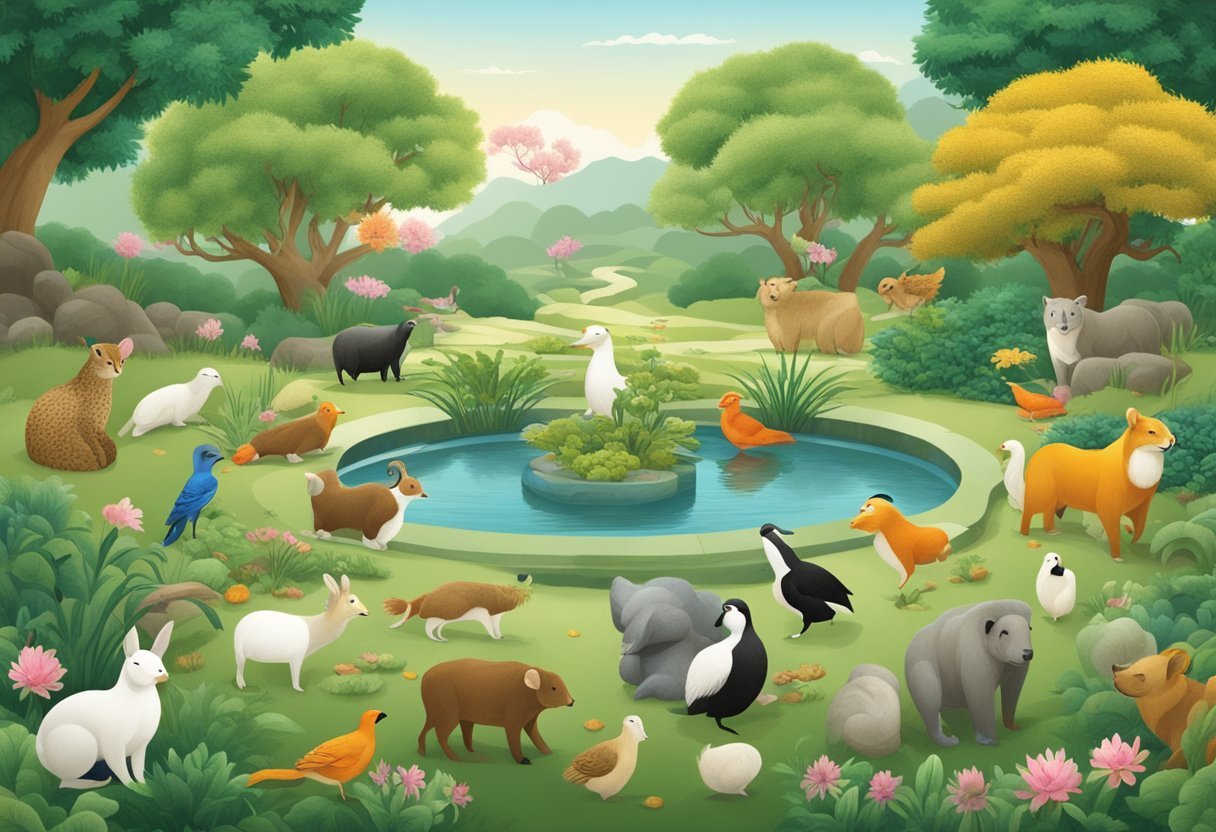
The Chinese Zodiac plays a significant role in various aspects of life, from career choices to relationship compatibility. Understanding the implications of each zodiac sign can guide individuals in making informed decisions based on their characteristics and traits.
Influence on Daily Life: Career and Health
Each of the twelve zodiac animals carries specific personality traits that influence career paths. For instance, those born in the Year of the Rat are often ambitious and resourceful, making them well-suited for leadership roles. In contrast, people born under the Ox are diligent and reliable, excelling in structured environments.
Regarding health, zodiac signs are also believed to dictate predispositions toward certain ailments. For example, individuals born in the Year of the Horse may be more prone to stress-related issues due to their energetic nature. Understanding these nuances allows individuals to adopt proactive health measures tailored to their zodiac traits.
Compatibility and Relationships
Compatibility in relationships is a central aspect of the Chinese Zodiac. Each sign has particular matches that are thought to create harmonious partnerships. For instance, individuals born in the Year of the Tiger often find compatibility with Dogs and Horses, who share their adventurous spirit.
In love compatibility, the zodiac can guide dating and marriage choices, as certain signs create stronger bonds. For example, those born in the Year of the Rabbit are believed to have a natural affinity with Sheep, fostering a nurturing connection. Recognizing these dynamics can enhance relationship satisfaction and longevity.
Fortune-Telling and Predictions
The Chinese Zodiac is an integral part of fortune-telling practices. Individuals often consult zodiac predictions to gain insights into their fortunes for the year. This practice is especially prominent during the Lunar New Year, where specific predictions are made based on one’s zodiac sign.
Ben Ming Nian, or a person’s zodiac year, is considered a particularly challenging time that may bring misfortune. During this year, individuals may seek fortune-telling to navigate potential challenges. Predictions often cover various aspects of life, including career opportunities, health alerts, and relationship forecasts, providing valuable guidance for the upcoming year.
The Zodiac Signs in Depth
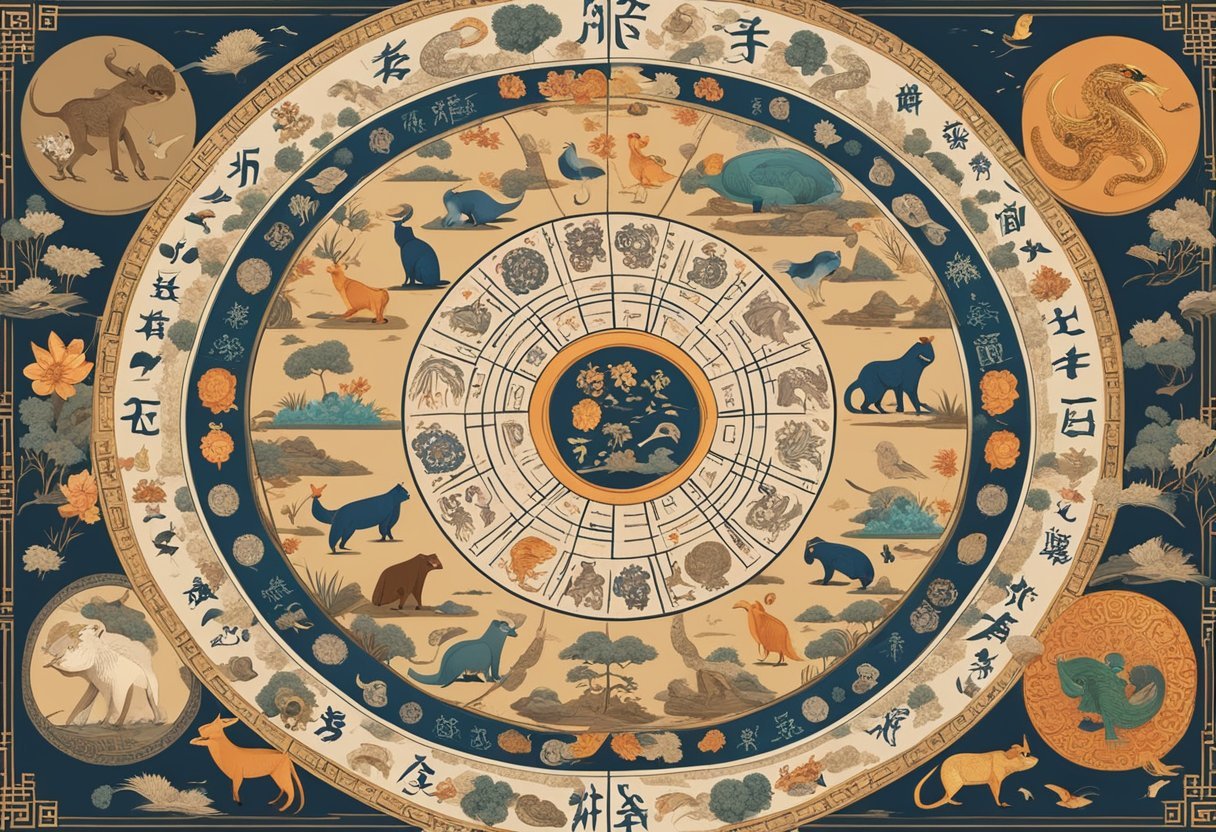
Each Chinese Zodiac sign possesses unique traits and characteristics that define the personalities of those born under them. These signs also influence an individual’s destiny, relationships, and life choices.
Rat: Clever and Resourceful
Individuals born in the Year of the Rat are known for their intelligence and adaptability. They exhibit an innate ability to solve problems creatively, often finding innovative solutions in challenging situations.
Rats are characterized by their charm, making them exceptionally persuasive in social interactions. They tend to be resourceful, often utilizing their wit to navigate complex environments. However, their cleverness may sometimes be perceived as cunning, leading others to view them with suspicion.
Their strengths also include strong intuition and a keen sense of observation, allowing them to read situations effectively. Rats are social creatures, enjoying company and often thriving in collaborative environments.
Ox: Diligent and Dependable
Those born under the Ox sign are celebrated for their dedication and reliability. They are hardworking individuals, often praised for their perseverance and strong work ethic.
Oxen are methodical thinkers who approach tasks with patience and tenacity. They are known for their ability to remain grounded, even amidst chaos. This steadfastness makes them valuable allies in both personal and professional realms.
Typically, Oxen possess a strong sense of responsibility, consistently meeting their commitments. Their honesty is a hallmark of their personality, earning them the trust of peers. They may also have a traditional approach to life, valuing family and community.
Tiger: Bold and Adventurous
The Tiger is synonymous with courage and zest for life. Those born in this year are often seen as fearless leaders, unafraid to take risks.
Tigers thrive in dynamic environments, relishing challenges that allow them to demonstrate their boldness. Their adventurous spirit often leads them to explore new opportunities and experiences.
However, their assertiveness can sometimes be perceived as aggression, particularly if they feel threatened. Tigers are known for their strong sense of justice, often standing up for what they believe is right. Their charisma naturally draws people to them, making them influential figures.
Rabbit: Gentle and Compassionate
Individuals of the Rabbit sign are often seen as nurturing and gentle. They embody compassion, showing genuine concern for the well-being of others.
Rabbits are characterized by their artistic sensibilities, often expressing themselves through various creative outlets. They prefer harmony and tend to avoid conflict whenever possible.
Despite their soft nature, Rabbits are also strong-willed when it comes to protecting their loved ones. Their quiet determination allows them to navigate life with grace. They value peace and often serve as mediators in disputes, using their empathetic nature to foster understanding.
Dragon: Charismatic and Wise
The Dragon is one of the most revered signs in the Chinese Zodiac, symbolizing power and authority. Those born under this sign are often seen as charismatic leaders with a vision.
Dragons possess a unique combination of confidence and wisdom, allowing them to inspire others. Their dynamic personalities make them natural leaders, often attracting followers due to their enthusiasm and ambition.
While Dragons are bold and assertive, they also value knowledge and integrity. Their ability to strategize makes them formidable in competitive landscapes. However, their high expectations can lead to disappointment if others do not meet their standards.
Snake: Enigmatic and Intelligent
Snakes are known for their deep intellect and enigmatic nature. Individuals born in this sign often possess a mysterious aura that captivates others.
Snakes are analytical thinkers, valuing knowledge and wisdom. They tend to approach life with intuition, often relying on their instincts to guide them through dilemmas.
Though they may be reserved, Snakes are also capable of great insight, which allows them to uncover hidden truths in situations. Their charm and sophistication often draw others in, making them engaging conversationalists.
Horse: Energetic and Independent
Those born under the Horse sign are characterized by their vibrant energy and strong sense of independence. They relish freedom and often pursue new adventures with enthusiasm.
Horses are sociable, thriving in dynamic environments and enjoying the company of others. Their natural charisma often makes them the center of attention in social settings.
Resilience is a key trait of Horses, enabling them to bounce back from setbacks. They can also be impulsive at times, acting on instinct rather than careful consideration. This spirit of adventure is essential to their identity.
Goat: Peaceful and Artistic
Individuals born in the Year of the Goat are known for their peaceful demeanor and artistic talent. They often value tranquility, seeking harmony in their surroundings.
Goats are highly creative, finding expression in various art forms. Their sensitivity allows them to appreciate beauty and inspire others through their work.
Though generally gentle, Goats can be quite determined when pursuing their passions. They often prefer collaboration over competition, fostering a supportive environment for creativity and expression.
Monkey: Witty and Versatile
Monkeys are renowned for their wit and versatility. Those born in this sign possess a keen intelligence, making them quick thinkers and excellent problem-solvers.
Monkeys thrive on change and adaptability, often embracing new ideas and opportunities. Their playful nature allows them to engage others, making them enjoyable companions.
Despite their lightheartedness, Monkeys can be incredibly strategic, using their cleverness to navigate complex scenarios. They enjoy intellectual challenges and often approach life with a sense of curiosity.
Rooster: Confident and Honest
The Rooster symbolizes confidence and honesty in the Chinese Zodiac. Individuals born in this year are often outspoken and direct in their communication.
Roosters pride themselves on their integrity, making them trustworthy allies. They tend to be detail-oriented, often excelling in tasks that require precision.
Their self-assured nature allows them to lead effectively, often motivating others to strive for excellence. While they can be critical at times, their intentions are typically rooted in a desire for improvement.
Dog: Loyal and Just
Those under the Dog sign are known for their loyalty and strong sense of justice. They are reliable friends and partners, always willing to stand by those they care about.
Dogs exhibit a protective nature, often placing the needs of their loved ones above their own. They have a profound sense of fairness, making them advocates for the underdog.
Their honesty and straightforwardness are hallmarks of their personality. Dogs tend to be diligent workers and contribute positively to their communities.
Pig: Generous and Sincere
Pigs are celebrated for their generosity and sincerity. Individuals born in this sign often display a warm and welcoming demeanor, making them approachable.
Pigs value honesty and have a natural inclination toward nurturing relationships. Their compassion allows them to connect deeply with others, often creating lasting bonds.
Though they may appear simple, Pigs possess wisdom and a strong sense of ethics. Their friendly nature often brings joy to those around them, making them well-loved in their social circles.
Frequently Asked Questions
The Chinese zodiac consists of 12 animals, each with unique characteristics and meanings. Understanding how these animals are ordered, how to determine one’s sign, and the legends behind them provides insight into this rich cultural tradition.
How are the Chinese zodiac animals ordered?
The Chinese zodiac animals are ordered in a fixed sequence: Rat, Ox, Tiger, Rabbit, Dragon, Snake, Horse, Goat, Monkey, Rooster, Dog, and Pig. This order is cyclical and repeats every 12 years, with each animal representing a year in the cycle.
How can I determine my Chinese zodiac sign based on my birth year?
To determine one’s Chinese zodiac sign, it is essential to know the birth year. Each sign corresponds to specific years. For example, those born in 1996 are associated with the Rat, while individuals born in 1997 correspond to the Ox.
What are the meanings behind each Chinese zodiac animal?
Each animal in the Chinese zodiac carries distinct traits. The Rat is known for being clever, while the Ox represents diligence. The Tiger embodies bravery, and the Rabbit symbolizes peace. Continuing down the list, each animal reflects specific characteristics tied to its mythology and role in Chinese culture.
What animal represents the current Chinese New Year, and what are its characteristics?
As of 2024, the current animal is the Dragon, celebrated for its strength and good fortune. The Year of the Dragon typically brings energy, enthusiasm, and a sense of ambition to those born under its sign.
How does Chinese zodiac compatibility work between different animal signs?
Compatibility among zodiac signs is evaluated based on their elemental associations and personality traits. For instance, Rat pairs well with Dragon or Monkey, while signs like Dog and Rooster may experience challenges in compatibility. Rat’s cleverness often balances well with Dragon’s confidence.
What is the legend surrounding the selection of the 12 animals in the Chinese zodiac?
The selection of the 12 animals is rooted in a popular legend involving the Jade Emperor, who hosted a race. The first animals to reach the finish line secured their place in the zodiac. The cleverness of the Rat and the determination of the Ox played crucial roles in the outcome.


